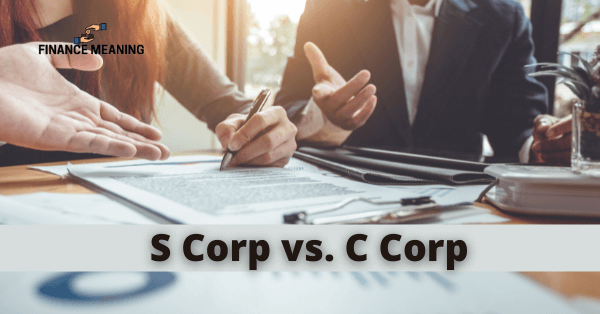Are you looking to choose between S Corp and C Corp to start your business? Although the comparison of S Corp vs. C Corp is difficult, we’ll try our best to clear everything. No one entirely knows about these two legal structures that are suitable for their business.
For a new company, there are many requirements to fulfill. Paying tax for its products or services is among them. To choose a proper track and avoid risks, you have to make a wise decision. For this, you should have complete knowledge regarding every legal structure.
If you want to know which entity is best for your business, you need to understand the similarities and differences. You will have to comprehend the pros and cons that will influence your business success.
This article guide will let you pick one yourself without an expert’s help. Before jumping into the details, let’s quote both terms a little bit to know what they are.
“The corporation that has elected a special tax status with the IRS and taxed under Subchapter S is called S Corporation.”
“The standard corporation performed under specific IRS rules and taxed under Subchapter C is called C Corporation.”
Similarities Between S Corp and C Corp
The selection decision also becomes difficult because there are several similarities between S corp and C corp. Some of the similar features of both structures are as under:
Limited Liability Protection
Limited liability protection serves to protect your assets from business liabilities and actions. If your firm provokes legal liability, it presents an inherent shield for the property you own. Both S and C corp keeps business owners free from business liabilities and debts.
Separate Legal Entities
When incorporated under state law, a company moves as a separate legal entity from its members. It holds its name, seal, assets, and liabilities different from its members. Both S and C corporations are separate legal entities working under state filing.
Filing Documents
The documents of a company are actually organizational documents or certificates that on filing with state forms the company. These formation documents are the same irrespective of the tax method you choose, whether S corp or C corp.
Structure
The structure of corporations consists of owners or shareholders, employees, officers, and directors. Every position plays a role in the corporation and helps to proceed with the business. All these structures are part of both the S corps and C corps.
Corporate Formalities
Corporate formalities, performed by owners, officers, or directors, are legal activities required for protection provided by the corporation’s formation. As the purpose is only protection, every corporation (S corp and C corp) executes all the legal actions.
Recommended Read | Gross Pay vs Net Pay: Help Employees Take Maximum Home Pay
Differences Between S Corp vs. C Corp
Despite the similarities, there are also some differences between S corp and C corp. These differences help you to compare S corp vs. C corp and make your decision.
Taxation
The most overwhelming thing that a new business faces and worries about is paying tax. Businesses deciding on s corp vs. c corp taxes must evaluate how the corporation taxes them.
C Corporations
The C Corporation is a separate taxable entity. It files a corporate tax return under Form 1120, and its taxes get paid on a corporate level. It includes the property of personal taxable income, divided to all business owners (dividends). Both corporate and individual level taxes are paid in this corporation.
S Corporations
Corporations with S forms pass through different taxable entities. The S corp files a federal informational return under Form 1120S. In this case, businesses will not pay corporate-level taxes. Whether there is profit or loss, it is shown up in the company. The individual owner will pay all taxes as a personal tax return.
Recommended Read | Amended Tax Return and Refund: How to Check it Online
Corporate Ownership
The corporate formalities of both S corp and C corp are the same; all individuals perform their jobs. But corporate ownership keeps differences between the two.
Flexibility and Restrictions
C corp is flexible, and it can have many owners. Citizens from any state can be the shareholder of C corp. In the case of S corp, there are restrictions of ownership. There could be less than a hundred owners, and they must belong to the United States.
Advantages of S Corp
Single Layer of Taxation
S corporations don’t have to pay corporate income taxes, which is their biggest advantage over C corporations. Thus, all income that the company distributes to its shareholders is taxed only by the individual owner.
20% Qualified Business Income Deduction
Under the 2017 Tax Cuts and Jobs Act, qualified shareholders of S corporations can deduct a 20% tax from their net “qualified business income (QBI).” So, it’s a significant turnover for individual business owners when paying tax.
Pass-through of Losses
Losses that occurred in the case of an S Corporation are “passed through” to its shareholders; they, in turn, can manage the losses to compensate income. Sooner or later, the shareholders pay taxes to the concerned organization.
Disadvantages of S Corp
Limited Number of Shareholders
S corp can have only less than 100 owners (shareholders), which you cannot publicize. It means there are limitations in increasing assets in the form of new investors.
Other Owners Restrictions
Another condition in S corp is that the owner must belong to the United States, making itself unable to get stake financing. It is due to the ineligibility of owners in terms of risk capital and private equity funds.
Preferred Stock Not Allowed
A corporation cannot hold diverse classes of stock to qualify for the S corp designation. Some investors aspire to receive dividends more favorably or have more advantages. You can’t get that from an S corp.
Advantages of C Corp
Unlimited Number of Shareholders
In contrast to S corp, C corp allows an unlimited number of owners a corporation has taxed per Subchapter C. Businesses whose products target potential investors will receive benefits from the C corp.
No Restrictions on Ownership
In C corp, anyone can have shares, which may be business entities, and the owner could be a non-U.S. citizen. It makes this corporation flexible and takes advantage of S corp.
No Restrictions on Classes
A corporation with C-corp status can allot one or more classes of stock. It includes preferred shares, which have partialities to dividends and deals.
Disadvantages of C Corp
Double Taxation
One of the significant and primary drawbacks of the C Corporation is paying taxes on its net incomes. The earnings of a corporation are taxed two times as owners pay taxes on dividends.
Recommended Read | Revenue vs Profit: Understanding Their Key Differences
How to Become a C Corporation (C Corp)?
No one becomes or forms a C corp or an S corp. You only start a period called the corporation period. When you file a document (Articles of Incorporation or Incorporation Certificate) with the state, you commence it and pay its fees.
First of all, you have to determine that the name you want for your corporation is available and choose its registered agent. Articles of Incorporation (filed document) must include the corporation name and that of the registered agent.
Once you complete the incorporation process, you can then fulfill other required information. The information comprises selecting bylaws, securing the first meeting among directors and owners, and allotting stock shares to shareholders.
If your corporation qualifies, it may be subject to tax under Subchapter S. Otherwise; it will be subjected to tax under Subchapter C.
How to Become an S Corporation (S Corp)?
When you have established your corporation after filing the Articles of Incorporation document with the state, you will have to choose a tax method. In case you want your corporation to taxing under Subchapter S, you have to file a form with the IRS, Form 2553.
The IRS instructions are hard to pursue and need an election to be held valid in an ongoing tax year. It is required when Form 2553 is complete and filed accurately.
If you file your election late back on the 15th day of the third month (16 March), it is generally adequate for the following year before the tax year ending. It is in a situation except you prove you were not timely because of a cognitive cause.
It is important to note that a few states will also expect you to file an S corporation election. You have to file all your information just after the incorporation of your business.
Frequently Asked Questions (FAQs)
Should I file as an S Corp or C Corp?
You should file as an S corp because of its significant advantage regarding Limited liability protection. With this protection, your assets are secured from any claims made by business lenders. You get all this protection irrespective of the corporation’s tax status.
Why would you choose an S corporation?
There are several reasons for choosing the S Corporation. But the primary reason we also mentioned in the above question is limited liability protection. If you compare the benefits of S corp vs. C corp, you can decide which one you should pick.
Is my LLC an S or C Corp?
To know if your LLC is an S corp or C corp. You can call the IRS Assistance Line to review your business file. They will come up to you with complete information whether your company is S corp or C corp. If filed under any other taxing, they will tell you that as well.
Conclusion: S Corp vs. C Corp
Well! That’s all about S corp vs. C corp and their advantages and disadvantages till now. You now might be in a position to decide which corporation is best for your company. The comparison of S corp vs. C corp tax advantages will help you in this context.




